When you buy via links on our site, we may earn a commission. Learn more.
If you’re learning English as a beginner, it’s easy to become overwhelmed with the amount of new words to learn. In fact, according to the Oxford English Dictionary, there are around 600 thousand words in English — a number so large it can easily make your head spin!
Fortunately, the good news is that you certainly don’t need to learn them all. Even more good news is that reading English vocabulary books for beginners will allow you to learn the important words that truly matter for good communication in English.
Then, by making sure you use your English on a regular basis, the vocabulary you learn will be reinforced and learned even more deeply.
In this short comparison, you’ll find the best English vocabulary books for beginners according to our review of dozens of the best on the market. Here they are in summary: —
Best English Vocabulary Books for Beginners
- Best overall for beginners — ‘504 Absolutely Essential Words’
- Best for conversation — ‘English Vocabulary in Use’
- Best for visual learners — ‘Oxford Picture Dictionary’
- Best storybook — ‘The Little Prince’
- Best for phrases — ‘102 Simple English Conversation Dialogues’
- Best for business vocabulary — ‘Business Vocabulary in Use’
Vocabulary Is Important for English Beginners
Before we dive in, let’s have a look at why vocabulary is important for learning English.
Simply put, vocabulary is important for learning English for the one key reason: it allows you to express yourself. The larger your vocabulary, the more effectively you can express yourself, and the more effectively you can express yourself, the more you can achieve in social contexts.
Having a large vocabulary can help you to make better connections with others and can improve your career opportunities. On the other hand, while having a smaller vocabulary doesn’t necessarily mean you’re a bad communicator (language, after all, is far more than words alone), it probably does mean that you’re not quite as good a communicator as you could be.
Fortunately, there’s an easy solution: the more you read, the more your vocabulary grows. And that’s precisely why books of all kinds play such a key role in helping you to improve your vocabulary. So, without further ado, let’s get into the list of the best English vocabulary books for beginners: —
Best Overall: 504 Absolutely Essential Words
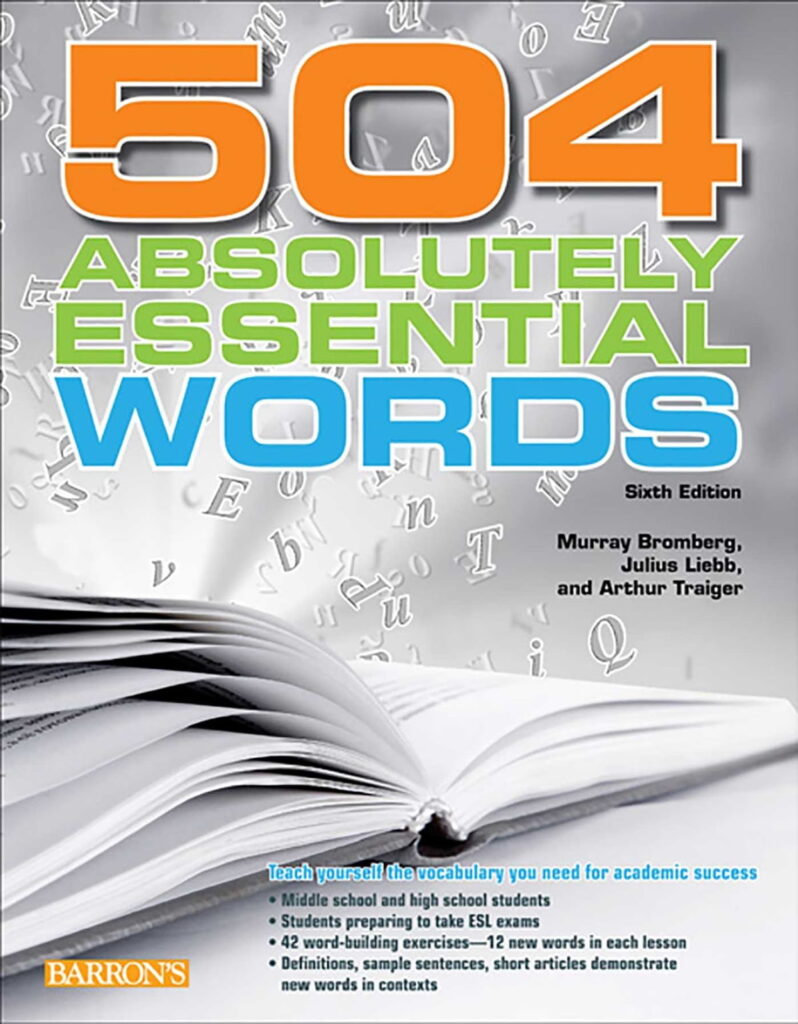
Minimum level: A2
Type: Vocabulary builder
Best for: Beginner or intermediate learners wanting to build a practical day-to-day vocabulary.
Although not suitable for absolute beginners (basic knowledge of English is required for this book), Murray Bromberg’s 504 Absolutely Essential Words is a good resource for improving beginner-level English vocabulary and one that can be used in a number of ways:
For example, the book is set up to be useful to self-taught adults, high school students, and foreign-language English learners all at once. Interestingly, it can be used as a reference book (much like a dictionary) or a learning program and exercise book.
If you choose to follow it as a structured course, you’ll probably find the book to be an excellent way to build your vocabulary. The book will introduce 12 new words per week for 42 weeks. The way it works is simple: you’ll learn the pronunciation, definition, and examples of each word, followed by a passage in which all the words are used and various creative exercises (including a picture-based exercise and fill-in-the-blanks, among others).
All in all, we think this structured but creative approach makes the book both fun and accessible, and we strongly recommend it for learning English vocabulary if you’re at A2 or B1 level.
Advantages
- Easy to progress fast and track progress.
- Provides the pronunciation, definition, and examples of each word.
- The vocabulary is useful and practical for everyday use.
- Fun and engaging exercises in each lesson.
Disadvantages
- Although beginner-friendly, it’s not suitable for absolute beginners.
Best for Conversation: English Vocabulary in Use
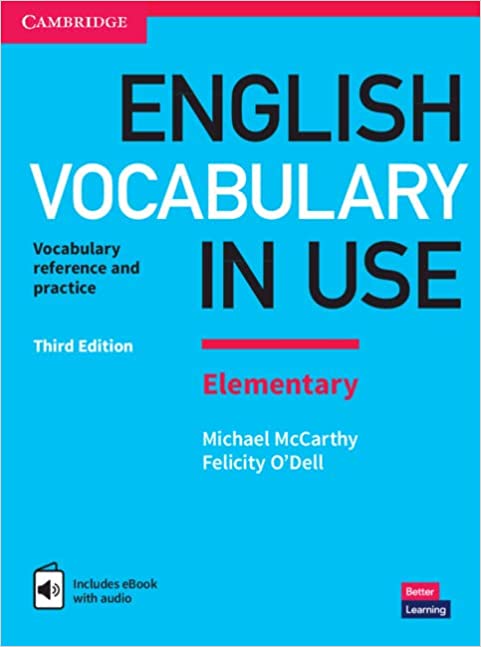
Minimum level: A1
Type: Vocabulary builder
Best for: Building your conversational vocabulary in English.
The first book in a series of four, English Vocabulary in Use (Elementary) is a classic vocabulary builder written by Michael McCarthy and Felicity O’Dell that’s aimed at beginners (with later books for intermediate, upper-intermediate, and advanced learners available too).
Well-known for its clarity, structure, and examples, English Vocabulary in Use is divided into different sections based on topics. A real strength of this book, in our opinion, is that a lot of the vocabulary is practically-oriented. For example, you’ll learn to use English expressions and informal terms, rather than only formal terms or verbose words that few people use in their day-to-day.
The exercises in the book also mirrors this technique: for example, you’ll be asked to recall vocabulary as if you were in a conversation or a job interview. All in all, using the English Vocabulary in Use workbook will be a good choice for improving your vocabulary at a beginner, as it covers a lot of ground and is very accessible, even for A1 learners.
Advantages
- Clear references and easy-to-understand examples.
- Includes conversational, colloquial, and idiomatic vocabulary.
- Large, well-structured book printed on high-quality paper.
Disadvantages
- Doesn’t go into as much depth as other books on this list.
Best for Visual Learners: Oxford Picture Dictionary
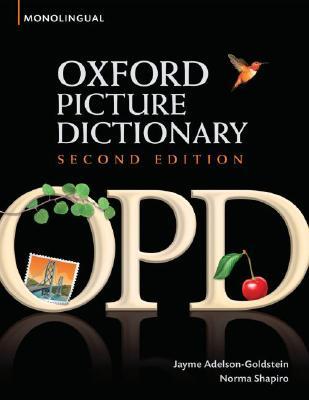
Minimum level: A2
Type: Picture dictionary
Best for: Seeing and visualising the definitions of words in the form of pictures.
Probably the best-known book teaching vocabulary through visual illustrations, the Oxford Picture Dictionary is a favourite among teachers and students for its completeness on the one hand, and for bringing words to life on the other.
Although filled with colourful pictures, the book managed to go into a lot of detail nonetheless. It’s divided into 12 ‘thematic units’, each corresponding to a broad subject (e.g. everyday language, people, housing, food and recreation, etc.). Each thematic unit is further divided into around a dozen or more subjects of roughly a page or two each.
The illustrations are clear and colourful, albeit rather dominating on the page.
We’d thoroughly recommend this book if you’re a visual learner in particular. However, because of its sizeable vocabulary that’s useful for day-to-day situations, and because of its engaging illustrations, we think Oxford Picture Dictionary is suitable for just about anybody at A2 level or above who wants to improve their English vocabulary in general.
Advantages
- Published by Oxford University Press, a top English-language publisher.
- Clear, colourful illustrations that bring vocabulary to life.
- Practical vocabulary that can be used in conversation.
Disadvantages
- No longer texts to provide deeper context.
- Lacks exercises and structured practice.
Best Storybook: The Little Prince
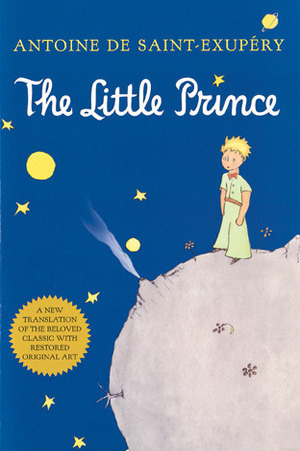
Minimum level: B1
Type: Fictional novella
Best for: Sharpening your English vocabulary by reading a story and not necessarily a structured vocabulary builder.
Closer Look
A true classic, Antoine de Saint-Exupéry’s The Little Prince is not only a much-loved children’s story that’s stood the test of time, but also one of the best-selling and most translated books ever to be published. Combined, these things make The Little Prince a fantastic way to learn language — especially for those who enjoy stories to begin with.
Originally published in English and French in 1943, The Little Prince has since been translated into over 250 languages and dialects and sold over 140 million copies around the globe. The fictional story follows a pilot who crash-lands in the Sahara Desert, only to meet a young boy who came to Earth from a faraway planet and calls himself “the little prince”. Whimsical and fairy-tale-like, the story provides both an interesting setting for children and a much deeper social commentary that can be appreciated by adults of all ages.
Although it’s difficult to compare The Little Prince to the other books on this list for the purposes of improving English vocabulary, we think it’s an excellent bet, especially if you’re inclined toward stories and learning vocabulary by reading larger texts.
Advantages
- A charming story that’s interesting and easy to read.
- A classic that’s stood the test of time.
Disadvantages
- As a storybook, it’s not geared toward learning vocabulary.
- Not suitable for complete beginners.
Best for Phrases: 102 Simple English Conversation Dialogues
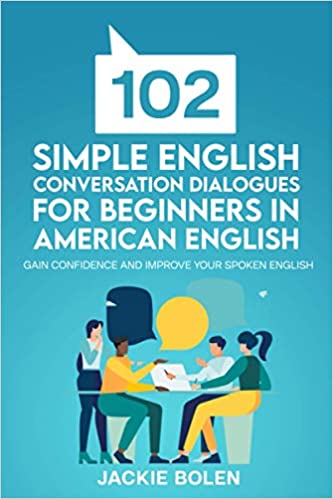
Minimum level: A2
Type: Vocabulary builder
Best for: Improving conversational English by learning everyday phrases and expressions.
If you’re wanting to speak English like a native speaker, one of the problems you will encounter is which phrases and expressions to use. Indeed, there are hundreds of common English phrases, and memorising them can help greatly in improving your fluency and confidence as a beginner.
This is the problem that 102 Simple English Conversation Dialogues For Beginners helps you to solve. By introducing commonly-used phrases and expressions used by native speakers (specifically in the US) and using them in texts to provide context, the book avoids the vocabulary-first approach seen in other books on this list, and instead tries to showcase the English language as it’s naturally used in day-to-day dialogue.
The result? A solid overview of colloquial English at the beginner level (although, in our opinion, the book lacks some of the more intensive vocabulary lists and exercises found in other books on this list). As a result, we think it’s an excellent choice if you’d like to learn everyday English phrases in particular, but not if you’d like to improve your English vocabulary in general.
Advantages
- Practical phrases, useful for day-to-day use.
- Excellent alongside a more comprehensive vocabulary builder.
Disadvantages
- Quite basic; not ideal for more advanced learners.
Best for Business: Business Vocabulary in Use
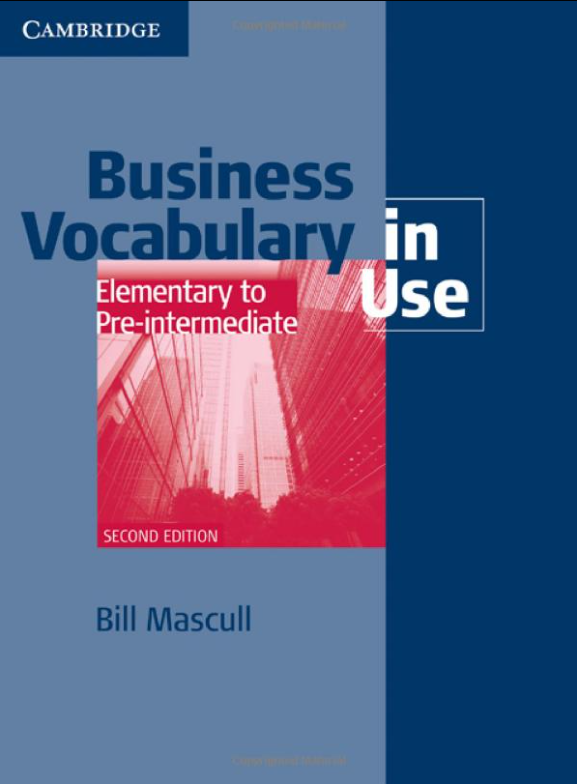
Minimum level: A2
Type: Vocabulary builder
Best for: Developing a practical understanding of the English words and phrases used in business.
Business English can be unusual and, at times, not very self-explanatory. For example, it’s easy to wonder at the subtle differences between “commerce”, “enterprise”, and “corporation”, or “to drop in” versus “to join in”. —
This is the kind of vocabulary and nuance you’ll learn in Business Vocabulary in Use (Elementary) (which is available at intermediate and advanced levels). This book uses neat examples and structured explanations to bring across the important aspects of business communication in an effective and approachable way.
For example, the book is broken into a number of parts (e.g. “Numbers”, “Socializing”, “Telephoning”) and then further divided into several chapters — each ending with a series of exercises such as fill-in-the-blank and open-ended questions.
Because of the clarity and thoroughness of the book in general, we rate it hands-down as the best book for English business vocabulary, as we found it much more extensive than similar beginner business English books we reviewed. And although we recommend having at least an A2 level of English for this series, this books (and its follow-ups) will probably otherwise be useful to you regardless of your level of English.
Advantages
- The book goes into a lot of depth about business.
- The vocabulary is practical and relevant.
- Interesting examples and explanations.
Disadvantages
- Exercises could be longer and more frequent.
- Can be too advanced for A1 learners.
What’s the Best English Vocabulary Book for Beginners?
To sum up, here are our picks for the two best English vocabulary books for beginners:
- 504 Absolutely Essential Words: Best all round (requires at least A2 level).
- English Vocabulary in Use: Best for conversational vocabulary (only requires A1).
If you’re B1 level of English or above, take a look at our best books to learn English vocabulary guide for our recommendations in general.
Tips to Improve Your Vocabulary As a Beginner
In the end, no book on this list alone will give you mastery of English vocabulary. Instead, these books are tools — tools which, with the right practise and motivation, will help you build your vocabulary and improve your English communication skills slowly but sustainably from a beginner level right up to an advanced one.
To maximise your results, we recommend combining the reading of the books on this list with the following in general:
- Reading English: Not only the books on this list, but blog posts on the internet, newspapers, children’s books, etc. The more you read, the larger your vocabulary will become. It’s as simple as that.
- Speaking English: Speak the language as often as you possibly can. Any spoken exposure to the language will naturally build your vocabulary quicker than you might imagine. If you have the opportunity to speak English with native speakers, all the better!
Keep motivated and keep practising. With time, you’ll quickly move beyond the beginner stage to a more comfortable and familiar understanding English.



